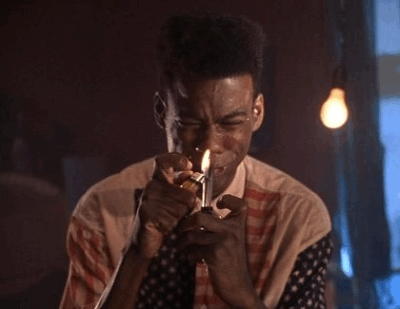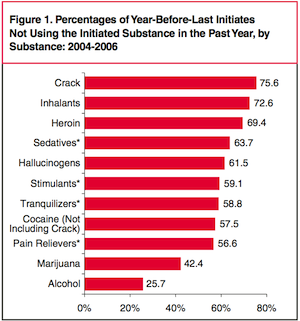The mayor of Toronto Canada, Rob Ford, admitted today that he smoked crack – according to the BBC:
Six months ago, the mayor said: “I do not use crack cocaine, nor am I an addict.”
On Tuesday, he said: “I made mistakes in the past and all I can do is apologise. But it is what it is and I can’t change the fact…
Mr Ford told reporters at city hall he had taken the drug about a year ago but was not an addict.
People are calling for his resignation, and that may be appropriate – I think it’s really up to the people of Toronto. There are plenty of reasons why you might think that someone who smokes or once smoked crack might not be a good mayor of city – however, the belief that he is an addict, is actually irrational at this point, and should not be used as a reason to demand his resignation.
Don’t get me wrong, he might have a huge crack smoking habit. I don’t know. But neither does anyone else.
I think the news stories have most people thinking that he’s got a crack addiction, and that he’s been lying about this addiction for 6 months now. Because, after all, crack is “instantly addictive”, crack rocks are like Lay’s Potato Chips – you can’t smoke just one. However, this may not be the case. The chances are high that he only smoked once; or that he smoked occasionally; or that he really didn’t even know he smoked once because he suffered memory loss during a night of heavy drinking when he also smoked crack. He may truly have no memory of it, and his knowledge of it that he’s now admitting to is based only on the fact that he was told that there is video of him doing.
Only he knows for sure whether he has a crack habit or not. Yet other people pretend to know – because they “know” certain myths about crack.
John Stewart referred to him as a “crack-head” (which means “crack addict” and comes along with an entire false stereotype) several times on The Daily Show last night – as well as getting laughs by suggesting that “at some point while pursuing this lifestyle, he will end up sucking some dick”, and repeatedly used these two stereotypes for easy laughs:
Granted, Stewart’s piece about Ford was funny, if your knowledge of crack use comes from movies like Menace II Society or New Jack City.

However, those movies portray several MYTHS about crack cocaine – the worst being the idea that if someone smokes crack just once, then they will instantly become “addicted” and do anything to get more crack. This is based on complete nonsense and hysteria – yet it still, obviously, persists today – as evidenced by the fact that it was immediately accepted and applauded as the premise of several jokes at Rob Ford’s expense by The Daily Show’s audience.
One of the most shocking things I learned while working in a retreat for people with substance use problems is that casual crack use is a real thing. I encountered countless people who considered themselves to be “alcoholics” who also used crack occasionally on one night here or there, when they had some extra money and happened to be hanging with friends who were into crack.
I’d heard people say there was no such thing as a casual crack smoker, but I was faced with countless people who testified to doing it. They didn’t seem to be ashamed either. It’s not as if they were in denial about their use and lying about it. They liked crack a lot, and owned that fact – they just didn’t happen to use it all the time like the “crackheads” we see in the movies.
I had smoked crack a few times in my own drug use career, and never felt addicted to it. It was just a thing I did out of desperation to get high a few times. I had somehow accepted the myth of “instantly addictive” crack – that whole idea that if you take one hit you’re instantly hooked forever – even though my own experience with the drug was different.but when I started hearing casually discussed casual crack use from my primarily heavy drinking students at the retreat, I thought back to my own experience and realized it wasn’t a far fetched claim based in denial that I was hearing from my students. It was their real experience.
 Eventually, I started to read a lot of research on substance use, and found out that most people who smoke crack do not continue to smoke it. And of those that do continue to smoke it more than once – only a minority become “addicted” (or “dependent”). The majority who’ve recently smoked it again are not using it in a way that meets clinical standards of “dependence.” For example, SAMHSA’s National Survey on Drug Use and Health found that of those who tried crack 2 years prior, less than a quarter of them (only 24.4%) had used it again in the past year. Only 9.2% used crack in the past year in a “dependent” manner. And thus, that leaves 15.2% who had used it in the past year, shall we say… “casually.” In fact, for all drugs studied, crack has the lowest percentage of past year users in that breakdown – check out the data for yourself here: Reality Check – Most Don’t Become Addicted.
Eventually, I started to read a lot of research on substance use, and found out that most people who smoke crack do not continue to smoke it. And of those that do continue to smoke it more than once – only a minority become “addicted” (or “dependent”). The majority who’ve recently smoked it again are not using it in a way that meets clinical standards of “dependence.” For example, SAMHSA’s National Survey on Drug Use and Health found that of those who tried crack 2 years prior, less than a quarter of them (only 24.4%) had used it again in the past year. Only 9.2% used crack in the past year in a “dependent” manner. And thus, that leaves 15.2% who had used it in the past year, shall we say… “casually.” In fact, for all drugs studied, crack has the lowest percentage of past year users in that breakdown – check out the data for yourself here: Reality Check – Most Don’t Become Addicted.
Any way you slice it, this indicates that a majority of those who used crack in the past year looked nothing like Pookie or the guy with the cheeseburgers or any other crack-fiend crackhead stereotype we’ve been fed by the media (I might also mention here that I knew several morbidly obese heavy crack users in my time on the streets – to bust another stereotype).
Moreover, laboratory studies have taught us that this supposed loss-of-control and zombie-like fiending that crack users are said to succumb to just isn’t realistic either. Does anyone remember neuroscientist Carl Hart who’s been making the rounds lately promoting his book on this research? Well, let me remind you. Hart works at Columbia University, and keeps heavy crack users in a lab to test whether they can say no to crack after he lets them have a taste. Long story short, they are able to say no. Hart had been a big believer in the crack myths himself, but couldn’t retain those beliefs when faced with the data:
Indeed, my cousins Michael and Anthony had stolen from their own mother, and I had attributed this abhorrent behavior to their “crack cocaine addictions.” I saw what happened as crack first took hold in Miami’s poorest black communities. Falling for media interpretations and street myths about all of these experiences had originally misled and misdirected me. Some of that, as we shall see, may ironically have helped me at certain times. But more often, it was a distraction, one that prevented me and so many others in my community from learning how to think critically.
He describes what he learned in the lab, in some excerpts from his book:
…over and over, these drug users continued to defy conventional expectations. Not one of them crawled on the floor, picking up random white particles and trying to smoke them. Not one was ranting or raving. No one was begging for more, either— and absolutely none of the cocaine users I studied ever became violent.
…the data showed that both forms of cocaine produce identical effects; these effects are predictable. That is, as the dose is increased, so are the effects, whether they are blood pressure and heart rate or subjective “high” and addictive potential.
…as we know from experience with alcohol, drinking itself isn’t a problem for most people who do it. As we will see, the same is true for illegal drugs, even those we have learned to fear, like crack cocaine and heroin.
Under one condition, I gave methamphetamine addicts a choice between taking a big hit of methamphetamine (50 mg) or five dollars in cash. They took the drug on about half of the opportunities. But when I increased the amount of money to twenty dollars, they almost never chose the drug. I had gotten similar results with crack cocaine addicts in an earlier study. This told me that the addictive potential of methamphetamine was not as had been claimed; its addictiveness wasn’t extraordinary. My results also showed me that methamphetamine addicts, just like crack addicts, can and do make rational decisions, even when faced with a choice to take the drug or not.
So, when “crackhead mayor” Rob Ford tells us:
“Yes, I have smoked crack cocaine… But no, do I, am I an addict? No. Have I tried it? Probably in one of my drunken stupors, probably approximately about a year ago.
I’m inclined to believe him. Casual crack use, or experimental crack use is both possible and probable.
Does that mean I think he should continue to be the mayor of Toronto? Not necessarily. I’m just saying, don’t make your decisions about that matter based on a faulty assumption that he must be a “crackhead” or crack addict. He’s a guy who admits to trying crack. He says it was a bad decision, and that he’s not an addict – and it’s silly to assume this is an impossibility. Think about it this way: if you didn’t believe the myths about crack use, then a night of dabbling in crack use by this guy is essentially the same as one of Teddy Kennedy’s nights of drunkenness – and how many of those did Kennedy get away with? Without the crack myths, Ford’s behavior actually pales in comparison to Kennedy’s many dalliances.
PS – the whole notion of addiction itself is flawed, but that’s a bigger discussion.
PPS – Also, I’m a bit surprised that Canadians are so outraged about this happening when they actually hand out free crackpipes in their country.
Citation:
